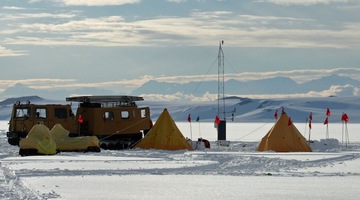The tents used in Antarctica are special tents called 'Scott’s Polar Tents' which are very durable and keep in the heat. The scientists often share their tent with another person. They have to store all their personal equipment inside so conditions are at times cramped, making it very important that everyone co-operates.
Points of interest for teachers:
- Students might want to think about how heat is generated inside the tents?
Transcript
DR MEGAN BALKS
The tents that we usually use are called Scott Polar tents and when two people share these one of these tents we have our cooking gear at one end of it and a little bit of space in the middle, so you have to be pretty co-operative with the person you’re working – living with because you might have to have turn about at standing up and getting dressed and stuff. They’re pretty comfortable and very tough. I’ve had extreme strong winds and sat inside when it sounded like a drum, but they haven’t blown away on us, so that’s good. We don’t really heat them per se. When we’re cooking our meals we have the primus going and that will generate some heat in the tent and the tent protects you from the wind. Then if it’s really cold weather you might have to wear more clothes in the tent – I mean we never take all our clothes off pretty much – you know you stay dressed and if it’s really cold you get in your sleeping bag as well. We have really good sleeping bags, I’ve never been cold sleeping in Antarctica and that’s really important to know, you know, you have to know that when you get back in that sleeping bag you’re going to be warm and cosy because – after a day being out battling the cold, working in difficult conditions it’s very comforting to have that warm bed to come home to.


